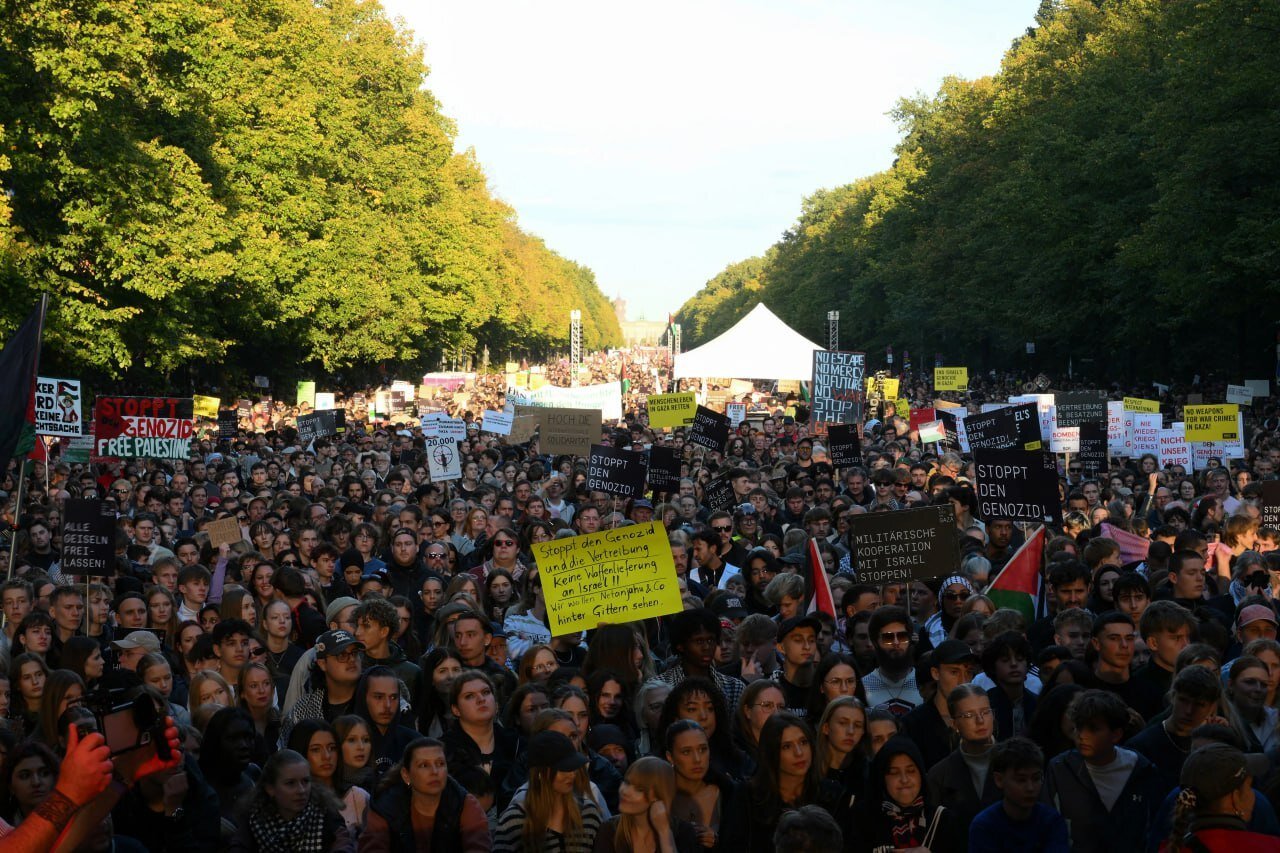Germans demand government end support for Gaza butcher
100,000+ marched in Berlin against Israeli genocide and government complicity

TEHRAN – The growing disconnect between public sentiment in Germany and the government’s pro-Israel stance was on full display this weekend as Berlin hosted its largest-ever protest in solidarity with Gaza, against the backdrop of Israel’s nearly two-year military campaign in the territory.
Organizers of the “All Eyes on Gaza” rally said more than 100,000 people filled central Berlin on Saturday, condemning Israel for committing “genocide” against Palestinians and accusing the German government of downplaying the scale of atrocities in Gaza.
“The actions of the Israeli government have long been described as genocide by experts and international organizations, and the International Court of Justice is investigating them as such,” the organizers said in a statement. “While it is clear that the Israeli military is committing mass atrocities in Gaza, the German government continues to deny the systematic violence.”
The protest, coordinated by an alliance of roughly 50 groups—including pro-Palestinian organizations, The Left party, Medico International, and Amnesty International—called for an immediate halt to German arms exports to Israel. Demonstrators also urged the European Union to impose sanctions on Israel and demanded unhindered humanitarian access to Gaza.
According to Deutsche Presse-Agentur (DPA), chants of “Free Palestine” and “Long live international solidarity” reverberated through the crowd, alongside placards reading “Gaza – Stop the massacre,” “Never again for everyone,” and “Freedom for Palestine.” In a speech, The Left party leader Ines Schwerdtner criticized the government’s perceived inaction. “The chancellor and ministers talk, but they do not act,” she said, adding that German officials “remain silent about the genocide—and make themselves complicit.”
Berlin police deployed around 1,800 officers and reported arrests amid scuffles with demonstrators.
The protest comes in the wake of an independent United Nations inquiry that concluded Israel has committed genocide against Palestinians in Gaza. Israel-based human rights groups have reached similar conclusions, and the International Court of Justice (ICJ) is also reviewing allegations of genocide. Meanwhile, UN agencies warn that large portions of Gaza’s population are facing famine.
Germany has historically maintained close ties with Israel, remaining one of its largest arms suppliers. It has continued to provide military support to Prime Minister Benjamin Netanyahu’s government, who has been labeled the ‘butcher of Gaza.’Yet public opinion appears to be shifting. A recent survey indicated that over 60 percent of German voters believe Israeli actions in Gaza constitute genocide, creating mounting pressure on the center-right government to reevaluate its policy.
While Chancellor Merz and Foreign Minister Johann Wadephul have recently intensified criticism of Israel’s military offensive and blockade of humanitarian aid, they have stopped short of using the term genocide, instead labeling the military actions as “disproportionate.” Germany has also yet to recognize the State of Palestine, in contrast to countries such as France, the United Kingdom, Australia, and Canada.
The massive demonstration underscores a palpable shift in German public sentiment as the death toll in Gaza continues to rise. According to Gaza’s Health Ministry, more than 66,000 people have been killed since Israel’s campaign began in October 2023, with the true figure likely higher due to victims still trapped under rubble.
The protest in Berlin powerfully signaled solidarity with Palestinians and drew attention to the resilience of their enduring spirit of resistance. It also highlighted a growing domestic challenge to Germany’s long-standing alliance with Israel. Whether the German government will meaningfully heed public sentiment remains unclear, but the scale of citizen mobilization could increasingly pressure policymakers to reconsider arms exports, humanitarian aid, and broader foreign policy decisions in the months ahead.
Leave a Comment